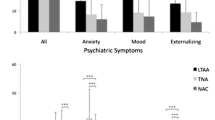Abstract
The influence of psychiatric comorbidity on the course and outcome in a nationwide representative sample (n = 351) of treatment-seeking substance users over a 28-month period was studied prospectively. The patients were administered the Diagnostic Interview Schedule and a questionnaire on drinking history. At 16 and 28 months after admission the patients returned a questionnaire on drinking history and mental health. In cases of those lacking information on either follow-up (45%), details on drinking status was obtained from informants. Completely abstinent were 16%. Generalized anxiety disorder and/or social phobia at the index admission predicted abstinence during the follow-up [odds ratio (OR) = 0.25], whereas onset of alcoholism among these patients after age 25 years predicted a worse prognosis (OR = 13.5). Also increasing number of social consequences related to abuse (OR = 1.3) and drinking more than the median (OR = 2.1) predicted a poor outcome. The abstinent group had significantly better mental health at follow-up. The patients with comorbid psychiatric disorders at admission were worse at follow-up. Although substance use disorders and comorbid psychiatric disorders have to a certain degree separate courses, there is nevertheless significant interaction between them. Early treatment and recognition of comorbid psychiatric disorders among substance abusers is necessary.
Similar content being viewed by others
References
Babor TF, Hofmann M, DelBoca FK, Hesselbrock V, Meyer RE, Dolinsky ZS, Rounsaville B (1992) Types of alcoholics, I. Evidence for an empirically derived typology based on indicators of vulnerability and severity. Arch Gen Psychiatry 49: 599–608
Berwick DM, Murphy JM, Goldman PA, Ware JE Jr, Barsky AJ, Weinstein MC (1991) Performance of a five-item mental health screening test. Med Care 29: 169–176
Buydens-Branchey L, Branchey MH, Moumair D (1989) Age of alcoholism onset. Relationship to psychopathology. Arch Gen Psychiatry 46: 225–230
Donovan DM, Mattson ME (1994) Alcoholism treatment matching research: methodological and clinical issues. J Stud Alcohol Suppl 12: 5–14
Frances RJ, Borg L (1993) The treatment of anxiety in patients with alcoholism. J Clin Psychiatry 54: 37–43
Harris WA, Harris NF (1987) C-DIS Computerized Diagnostic interview schedule. Ottawa Civic Hospital, Ottawa
Hendriks VM (1990) Psychiatric disorders in a Dutch addict population: Rates and correlates of DSM-III diagnosis. J Consult Clin Psychol 58: 158–165
Kadden RM, Kranzler HR, Rounsaville BJ (1995) Validity of the distinction between “substance-induced” and “independent” depression and anxiety disorders. Am J Addict 4: 107–117
Kessler RC, Nelson CB, McGonagle KA, Edlund MJ, Leaf PJ (1996) The epidemiology of co-occurring addictive and mental disorders: implications for prevention and service utilization. Am J Orthopsychol 66: 17–31
Kleinbaum DG, Kupper LL, Muller KE (1988) Applied regression analysis and other multivariate methods. PWS-Kent, Boston
Längle G, Mann K, Mundle G, Schied H (1993) Ten years after: the posttreament course of alcoholism. Eur Psychiatry 8: 95–100
McLellan AT, Lubosrsky L, Woody GE, O’Briem CP, Druley KA (1983) Predicting response to alcohol and drug abuse treatments. Role of psychiatric severity. Arch Gen Psychiatry 40: 620–625
Powell BJ, Penick EC, Nickel EJ, Liskow BI, Riesenmy KD, Campion SL, Brown EF (1992) Outcomes of co-morbid alcoholic men: a 1-year follow-up. Alcohol Clin Exp Res 16: 131–138
Regier DA, Framer ME, Rae DS, Locke BZ, Keith SJ, Judd LL, Goodwin FK (1990) Comorbidity of mental disorders with alcohol and other drug abuse. Results from the Epidemiological Catchment Area (ECA) study. J Am Med Assoc 264: 2511–2518
Reich J, Perry JC, Dyck I, Vasile R, Goisman RM, Rodriguez-Villa F, Massion AO, Keller M (1994) Comparison of personality disorders in different anxiety disorder diagnoses: panic, agoraphobia, generalized anxiety, and social phobia. Ann Clin Psychiatry 6: 125–134
Robins LN, Heizer JE, Croughan J, Ratcliff KS (1981) The National Institute of Mental Health Diagnostic Interview Schedule. Arch Gen Psychiatry 38: 381–389
Ross HE, Glaser FB, Germanson T (1988) The prevalence of psychiatric disorders in patients with alcohol and other drug problems. Arch Gen Psychiatry 45: 1023–1031
Rounsaville BJ, Dolinsky ZS, Babor TF, Meyer RE (1987) Psychopathology as a predictor of treatment outcome in alcoholics. Arch Gen Psychiatry 44: 505–513
Roy A, DeJong J, Lamparski D, Adinoff B, George T, Moore V, Garnett D, Kerich M, Linnoila M (1991) Mental disorders among alcoholics. Relationship to age of onset and cerebrospinal fluid neuropeptides. Arch Gen Psychiatry 48: 423–427
Schuckit MA, Hesselbrock V (1994) Alcohol dependence and anxiety disorders: What is the relationship? Am J Psychiatry 151: 1723–1734
Shaw GK, Waller S, McDougall S, MacGarvie J, Dunn G (1990) Alcoholism: a follow-up study of participants in an alcohol treatment programme. Br J Psychiatry 157: 190–196
Stefánsson JG, Líndal E (1990) The Diagnostic Interview Schedule (DIS IIIA; Icelandic version). University of Iceland Publications, Reykjavík
Tómasson K, Vaglum P (1995) A nationwide representative sample of treatment-seeking alcoholics: a study of psychiatric comorbidity. Acta Psychiatry Scand 92: 378–385
Tomasson K, Vaglum P (1996) Psychopathology and alcohol consumption among treatment-seeking alcoholics: a prospective study. Addiction 91: 1019–1030
Vaillant GE (1995) The natural history of alcoholism revisited, Harward University Press, Cambridge
Vaillant GE, Clark W, Cyrus C, Milofsky ES, Kopp J, Wulsin VW, Mogielnicki NP (1983) Prospective study of alcoholism treatment. Eight-year follow-up. Am J Med 75: 455–462
Author information
Authors and Affiliations
Rights and permissions
About this article
Cite this article
Tómasson, K., Vaglum, P. The 2-year course following detoxification treatment of substance abuse: the possible influence of psychiatric comorbidity. Eur Arch Psychiatry Clin Neurosci 247, 320–327 (1997). https://doi.org/10.1007/BF02922262
Received:
Accepted:
Issue Date:
DOI: https://doi.org/10.1007/BF02922262



